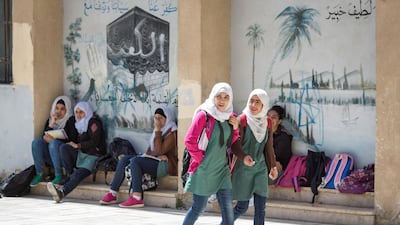Young Jordanians have called for more opportunities for young people outside of Amman.
Delegates from the Crown Prince Foundation, an organisation promoting young people headed by the king’s son, presented the results of a nation-wide search for ideas on how to improve quality of life and job prospects for the country’s large young population to business and political leaders in London on Thursday.
They asked their government and those investing in the region to improve transport infrastructure and share the resulting funds and pledges of assistance from the conference across the regions, not just in the capital Amman.
"I live in the capital Amman, so I was not fully aware of the challenges that were happening across Jordan," said Rousi Al Sardy, 20, a student of pharmaceutical sciences and CPF delegate told The National.
Ms Al Sardy said the group found opportunities were significantly lower for those living outside of the capital and other regional hubs like Aqaba and Irbid.
The group stress that opportunities arising from the conference, which is hosted by the UK and aims to encourage investment in the country, should be distributed evenly throughout the population.
“When we are talking about an inclusive economic growth we're also looking at including everyone in this growth. Not only the capital, not only the business centres but also positively impacting local communities,” said Sinan Assaid, 21, another of the youth delegates.
“When the government and the private sector are working on massive projects or investments or creating jobs… the local communities must always be considered,” he added.
Inadequate transport infrastructure is one of the largest barriers to young people joining the workforce. In particular, women are unable to access job markets and support networks in the larger cities, a 2019 Jordan INGO Forum paper found. Although Jordan’s national employment strategy 2020 included plans to improve road and rail links, little has been done so far, say NGOs.
The World Bank put women’s participation in the formal labour market at 13.9 per cent, compared to 63.6 per cent for men, while youth unemployment as a whole sits at 40 per cent.
The group is also asking its government to commit to providing quality, comprehensive education for Jordanians with a focus on “life skills and English language as a universal language to do business,” something the UK has pledged £25m to support.
The OECD has found similar issues with youth policy in the kingdom. A 2018 report found a mismatch between skills gained in education and labour market needs, exacerbated by a lack of programmes assisting young people in vocational training and career advice. This, coupled with a brain drain of talented Jordanians choosing to attend elite international universities outside of the kingdom and then taking jobs in those countries, has created a crisis in youth unemployment.
Sankara Narayanan, leader of The Economist Intelligence Unit's Middle East and Africa analysis team says the UK's contribution to education in the kingdom will be "beneficial" for the kingdom.
“The Jordanian government is aware that it needs to support its youth in this the difficult regional climate with a more business-friendly environment that includes both a more effective regulatory system and improved infrastructure, but progress will be slow,” he said.
Slow it may be, but it has the King’s backing.
King Abdullah, speaking also at the conference on Thursday, recognised the importance of education and appropriate job creation for Jordan’s economic future, said “Jordan took a good hard look at our economic agenda, and the result is clear – strategic refocus on our competitive advantages. In the spotlight, first and foremost, is our powerhouse of talented, aspiring young people.”


